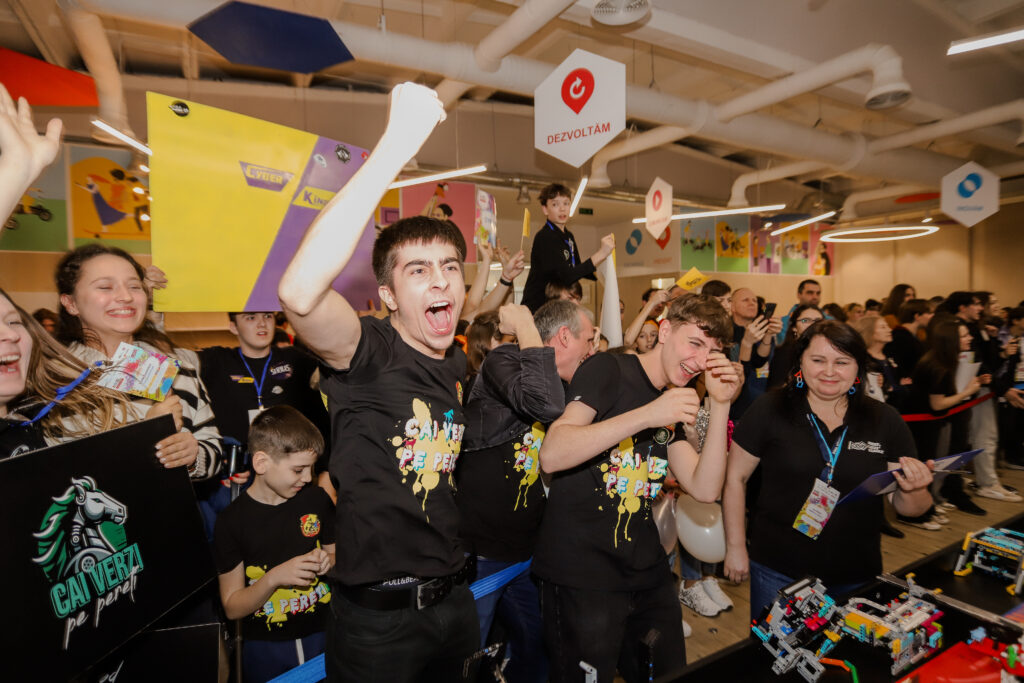
Moldova doesn’t rank high in education, but its students win gold medals in global robotics competitions. How?
“Vlad, you kind of showed me up there,” exclaimed a presenter at FIRST Global, the world’s biggest youth robotics competition. Behind him, teenagers were nervously adjusting their robots. “I said there weren’t many great shooters, but you just had an amazing machine shooting within the reservoir!”
The teams had three months to build a robot that could pick up different sizes of balls and then pour and shoot them into boxes on various heights within a limited space. Many other teams used their hands to throw balls into the lifted box.
Thousands of people gathered at that Singapore venue worldwide, and millions were tuned in through their screens.
Vladimir Corduneanu, a 17-year-old Moldovan, let out a proud smile. “Yes, we have the best shooter!” He and his four other team members — Cristian Romanciuc, Sanda Bostan, Nicolae Turcanu, and Andrian Bandalac — built it for a month. It was hard; they spent many sleepless nights together.
“It’s super impressive!” the host concluded.
Out of 191 national teams of teenagers, only 24 made it to the final last October. In some countries, being here is like getting into the Olympics. Kazakhstan held several national competitions among thousands of pupils until the best one was selected and sent to the global contest.
From seventeen award categories, Moldovan teams left Asia with a silver medal for the Global Innovator Award and a gold medal for Innovation in Engineering.
“Maybe we just didn’t know?”
It was not their first competition. Since robotics took off in Moldova a decade ago, they have been killing it in the field. They started with five teams only ten years ago, and now over 60,000 young Moldovans have been involved.
“Maybe we never knew that we are good?” said 32-year-old Florin Cazac, one of the country’s first robotics teachers. He was supervising the team in Singapore. After the collapse of the Soviet Union, Moldovan students weren’t given a chance to shine in the global arena, he explained, and added, “The country fell into shadows.”
Years of political turmoil shook the classrooms. “It took Moldova about ten years to finally write and print new materials when the political situation changed again, as Communists came to power,” Stanislav Juc explained in his PhD about the Moldovan education system. “During their governance, from 2001 to 2009, Communists decided against the Romanian-type of books and installed the old Russian-type books back in the educational system.” Moldovans are Romanian speakers.
The pro-European parties hold power now, and education is back on the European route. There is a long way to go. Among the 81 countries, Moldova ranks 50 in math and 51 in reading and science tests in OECD’s Pisa test.
But when robotics was introduced to Moldovan kids, they started competing and soon realized they were good!
It sometimes only takes a couple of enthusiastic adults to change the course of a generation.
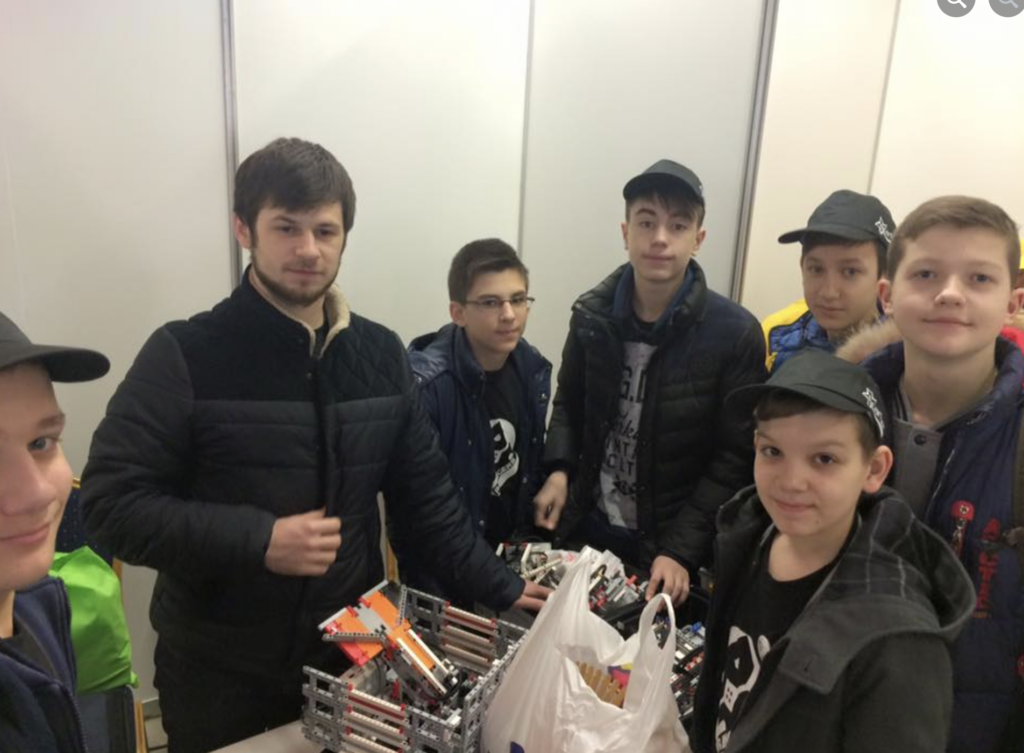
In 2014, USAID, an American development agency, funded the first Moldovan robotics course in a youth center, Artico, in Chisinau. “I took my son there,” remembers Veronica Esanu, who was then a business development specialist. At first, she was just an enthusiastic parent but is now one of the main advocates for teaching future technologies to Moldovan pupils. She recommended Florin, who had just graduated from computer science, to become his child’s robotics teacher.
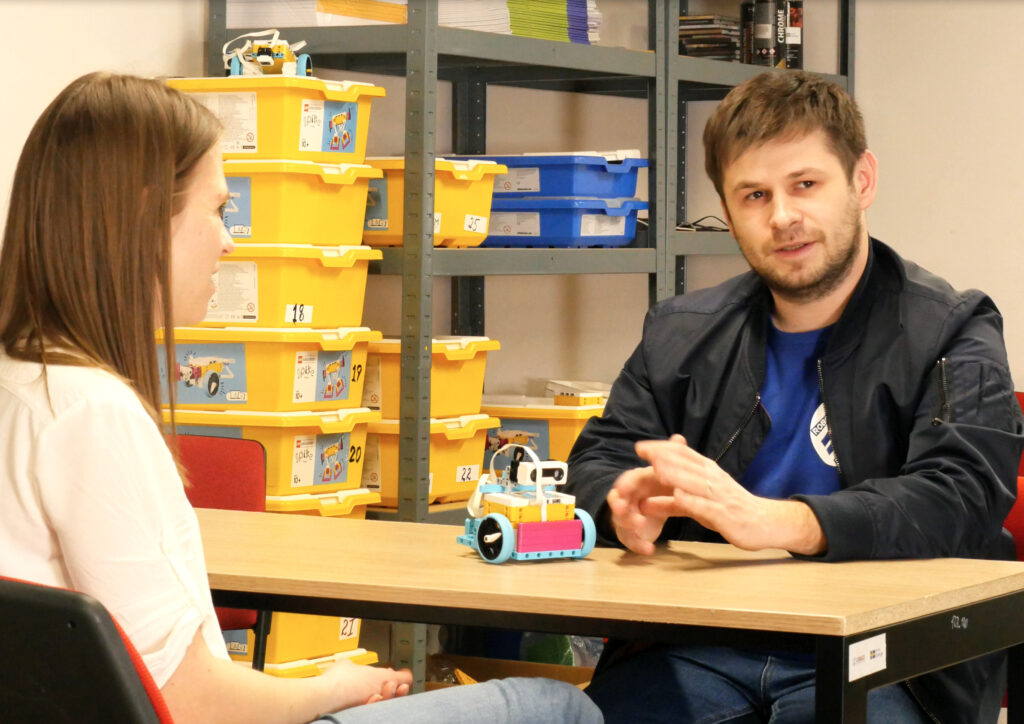
Florin knew nothing about the field. During his own studies at the Technical University of Moldova, the professors would read the theory to them. If they got lucky, they visited a lab or used a computer, but that’s about it. But Florin, having worked in the US, spoke English and, hence, had an advantage most teachers in Moldova didn’t have at that time. He discovered the whole world of hands-on, practical, inspired teaching. He got very excited.
“There was a spark inside me when I saw all this,” Florin said. “We never had anything like this in our country, where you build something that actually works.”
It wasn’t just about engineering and robotics to him. He saw that robotics is about human relationships. Even if you compete against each other, you stay friendly. Because the common enemy, in the end, is the problem that needs solving. “These things unite us and unify all the globe!” Florin said.
Florin takes a little robot off the shelf and says that the plastic guy does half of his job in the lessons. With the robot, it’s easy to keep the children engaged. After every lesson, Florin makes sure to leave time for imagination. He encourages the kids to experiment with new ideas and get creative!
And that small spark quickly turned into a fire.
One of his students, 13-year-old Andrian Bocancea at the time, designed the logo and called the first robotics enthusiasts “Robo Rangers.” They are still active, and he is now a mentor for the new students. In 2017, they moved to an IT hub, Tekwill. They filled their new room with bean bags, glued Post-it notes on the walls, and covered the floor with technology. Florin excitedly shared on his social media, “That’s how a classroom of the future looks like.”
It was all very exciting. Robo Rangers were taking over the world!
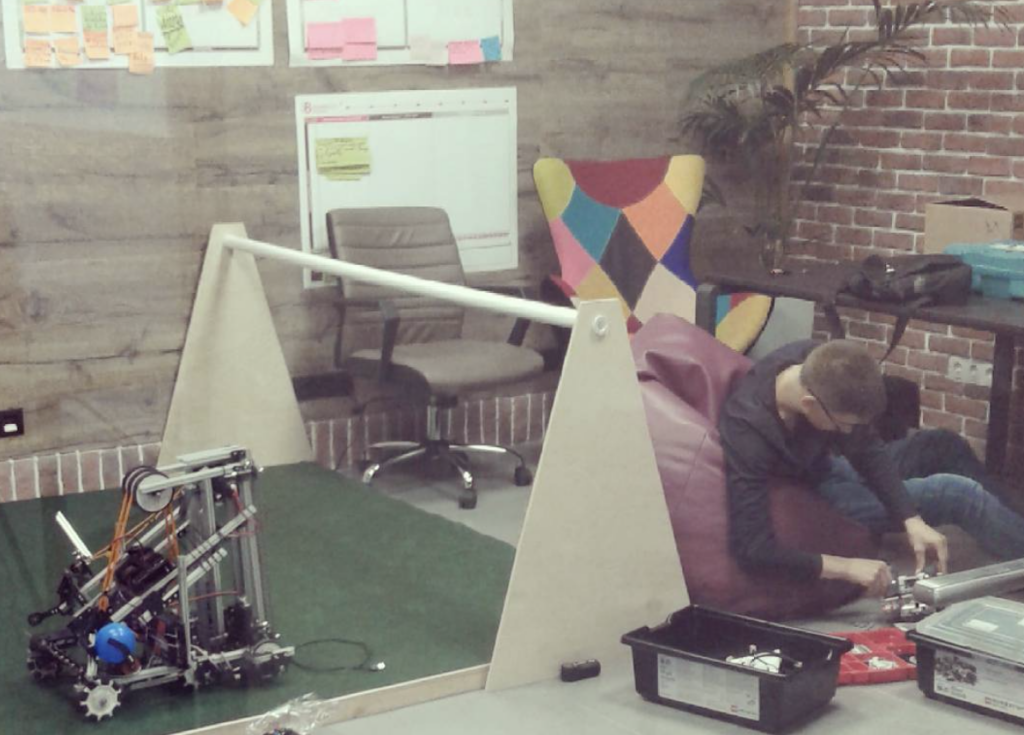
Remember Vlad in that global arena telling the world how amazing their robot was? Florin was his first robotics teacher and the reason he got into robotics. Vlad joined when he was ten. It was more than a hobby to him. They hung out after school with friends, building and dreaming. “Florin told us to never give up on the idea,” he recalls. Florin also told him not to overcomplicate and over-engineer things. It’s harder, but the best products are simplified, he used to say. Together with his friend, Nicolae Țurcanu, they are now some of the best young robot-builders in the country.
Vlad: “It’s in our blood to work hard and implement things, and we are very creative.” He then looks at Nicolea and giggles: “Sort of…”
Young Moldovans are now competing all over the world and coming back with medals. In 2019, they even brought back three gold medals from FIRST Global. Contests are also being organized in Moldova. Only a couple of weeks ago, 80 teams from all over Moldova came to the capital to see who was the best.
Florin’s real challenge now is to get his team to work together. “They are going through a period of their lives when they think they know everything best. It’s so hard to keep them together. But I try to speak to them every day. I ask them kindly to stop making decisions alone and speak to me and each other,” Florin said.
Moldova is already harvesting the fruit and building the next generation of specialists. Many of the former robotics students now study in top European universities. Niculae and Vlad also plan to study abroad. But then come back. “I want to use my skills to improve Moldova and show what we are capable of!” Nicolae says.
The hard work has paid off
“Moldova is a country we are very proud of!” said Matt Stalford, a spokesperson for the nonprofit public charity FIRST Global, which organizes annual robotics competitions. “It shows the hard work of citizens who believe everything is possible!” Matt added.
Besides, who doesn’t like robots? They are fun; they move and do things. What a clever way to get people excited about learning.
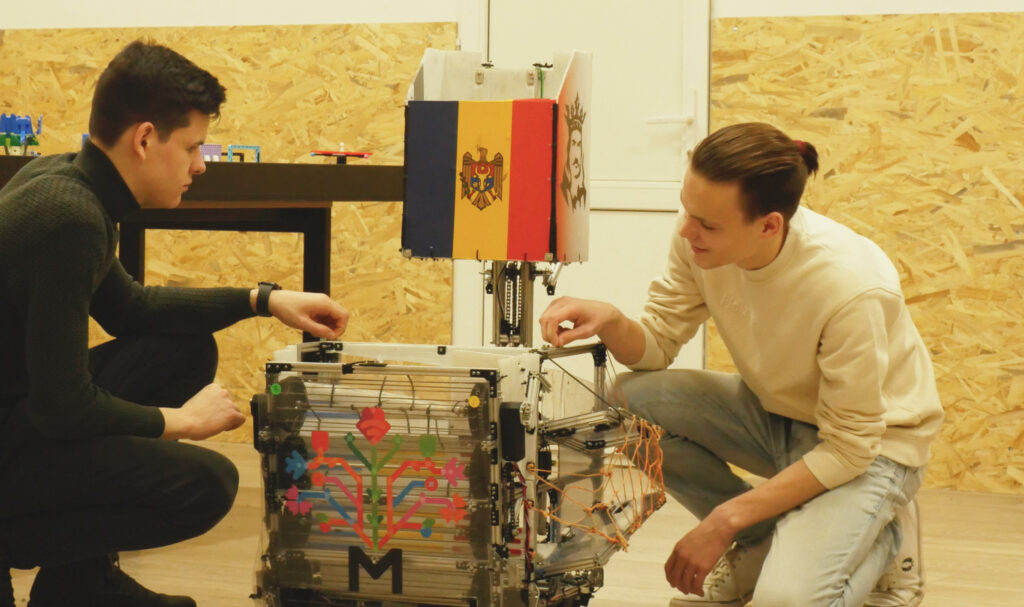
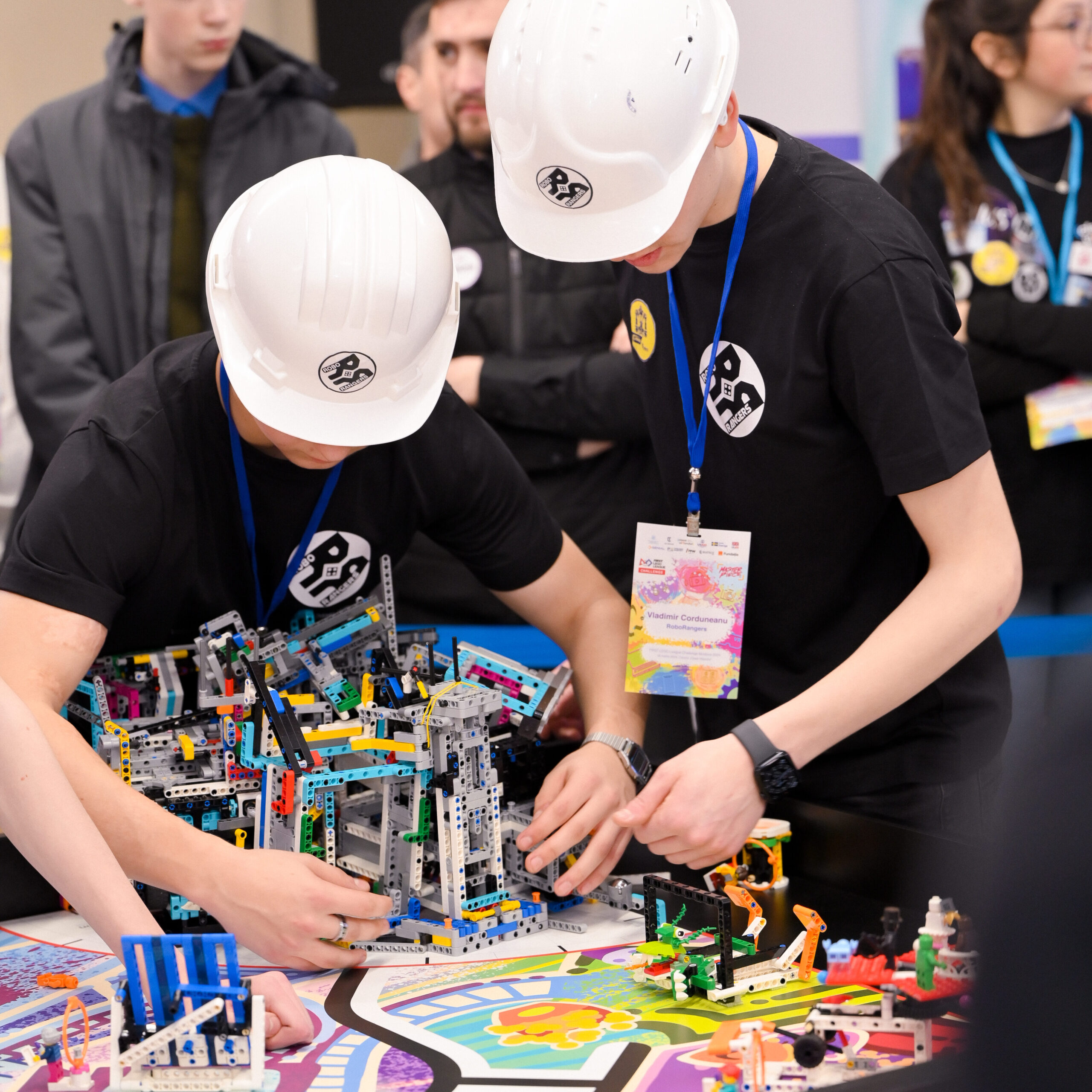

Leave a Reply